|
|
|
Sort Order |
|
|
|
Items / Page
|
|
|
|
|
|
|
| Srl | Item |
| 1 |
ID:
177689
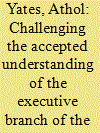

|
|
|
|
|
| Summary/Abstract |
The accepted understanding of what constitutes executive government in the United Arab Emirates (UAE) is that power rests with the Cabinet. This is, however, only partially correct. In reality, executive power over national security is excised from the Cabinet, and instead rests with a group of legislatively-defined agencies and posts. In other words, institutionally the UAE’s executive branch is bifurcated, with one part handling ‘high’ policy, meaning national security, and the other ‘low’ policy, that is all the rest. This article describes the unobserved part of the UAE’s executive branch. In doing so, it provides a significant advance in the understanding of the somewhat opaque nature of government in the UAE. Importantly, it provides a more nuanced understanding of the sources of power as they relate to the powerful Sheikh Mohammed bin Zayed Al Nahyan, a person often (mis)characterised as the de facto leader of the UAE.
|
|
|
|
|
|
|
|
|
|
|
|
|
|
|
|
| 2 |
ID:
177279
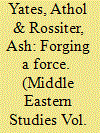

|
|
|
|
|
| Summary/Abstract |
It has long been observed that the development of professional security institutions is a key stage in modern state formation. Leaders of many proto-states embarking on programs of rapid development – such as many of the rulers of the Arab Gulf States in the 1960s – have brought in foreign professional expertise to assist in building up fledgling state institutions, including militaries, police forces and intelligence services. We know little, however, about the relationship between ruler and these key expatriates performing these functions. To help fill this lacuna, this article examines the first three expatriate professional heads of Abu Dhabi Police over the period 1959-68 and their relationship with their paymasters – first Shaikh Shakhbut bin Sultan Al Nahyan, then his brother, Shaikh Zayed. It details the difficulties these professional expatriates faced in operating within this ruler-dominated political-administration system. We believe observations made in this study have relevance to the contemporary Gulf, where governments continue to employ highly skilled expatriates in their security institutions and much else besides.
|
|
|
|
|
|
|
|
|
|
|
|
|
|
|
|
| 3 |
ID:
174207
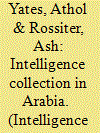

|
|
|
|
|
| Summary/Abstract |
Imperial powers, facing considerable information challenges in far-flung territories, adapted intelligence practices and machinery to fit local conditions. In contrast to the attention placed on British intelligence activities in territories considered within the ‘formal empire’ (i.e. where Britain was in direct control), we know very little about intelligence arrangements in ‘informal empire,’ where external powers exerted influence and protected their interests by working through local elites. Exploiting declassified documents and drawing upon interviews with retired intelligence officials, this article reveals Britain’s unique intelligence system in a remote corner of empire – the Trucial States (today’s United Arab Emirates) – which was built around a group of roaming officers tasked with collecting full-spectrum intelligence.
|
|
|
|
|
|
|
|
|
|
|
|
|
|
|
|
| 4 |
ID:
179022
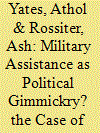

|
|
|
|
|
| Summary/Abstract |
What motivates states to provide others with military assistance? Traditional explanations naturally focus on the security interests of the sender state. But could domestic considerations – intra-party politics, for example – also be a factor in some cases? This analysis, which examines the British decision to send a Military Advisory Team [MAT] to the newly federated United Arab Emirates [UAE] in 1971, answers in the affirmative. It demonstrates that the MAT was primarily, albeit not exclusively, a means by which the British government of Prime Minister Edward Heath could stave off sharp criticism from fellow Conservative politicians that under his leadership that Britain was cutting and running from its overseas responsibilities. Furthermore, because the MAT was in inception a political tool, its military utility in assisting the UAE, or the influence Britain derived from its presence, was minimal at best and counterproductive at worst.
|
|
|
|
|
|
|
|
|
|
|
|
|
|
|
|
| 5 |
ID:
188340
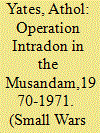

|
|
|
|
|
| Summary/Abstract |
This article examines Operation Intradon, a covert British counter-insurgency operation in the northern Omani enclave of Musandam. The operation, which ran from December 1970 to March 1971, was driven by the political aim of forcing the Sultan of Oman to take administrative control of this ungoverned enclave. This would then provide protection to the Strait of Hormuz oil route and remove a threat to the process of federating British protected states into what became the United Arab Emirates. We conclude by identifying what the operation says about how British military operations were crafted in Britain’s informal empire in the Gulf.
|
|
|
|
|
|
|
|
|
|
|
|
|
|
|
|
|
|
|
|
|